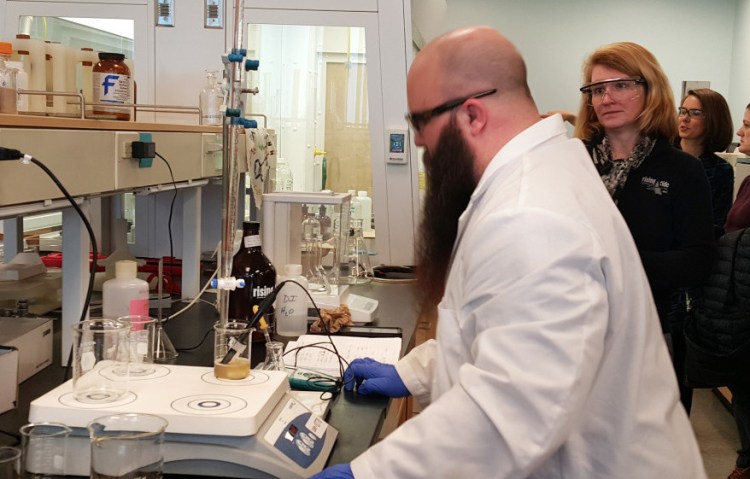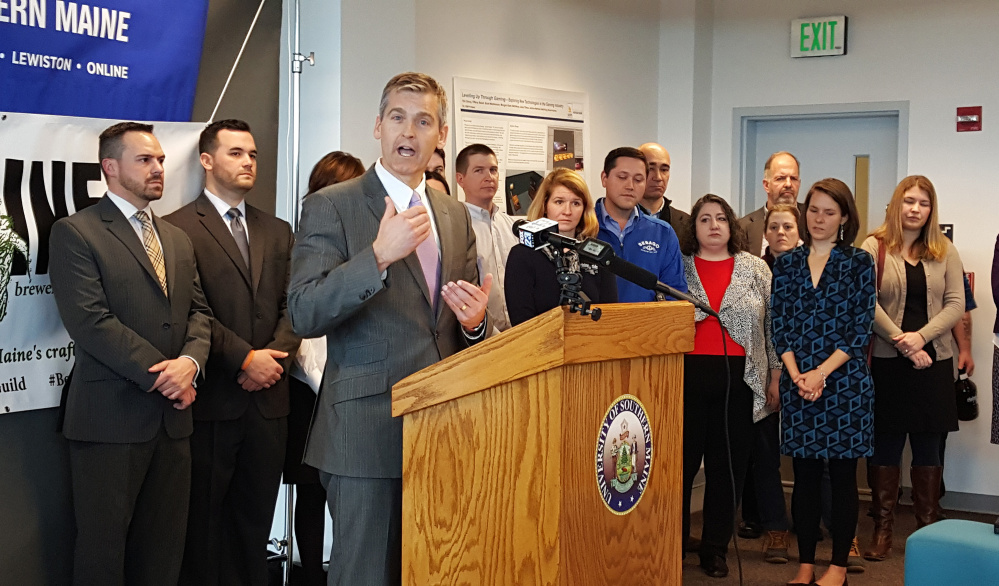University of Southern Maine President Glenn Cummings stood before a group of Maine brewery owners Thursday morning and was quick to acknowledge the irony of his situation. When university presidents talk about beer and students, he said, it’s usually not a good thing.
But Cummings said USM’s partnership with the Maine Brewers’ Guild on a new quality control lab is a tangible way to connect students with the community.
“This is the exact kind of partnership that we believe moves Maine forward,” Cummings said.
The university and brewers’ guild began to outline operations of the new lab last year. Under the partnership, students get real-world experience by testing various beer formulations and doing quality control analyses while brewers get a nearby and affordable testing facility.
The work will be performed at the school’s new Quality Assurance/Quality Control and Research Laboratory, which started with a $488,514, three-year seed grant from the Maine Economic Improvement Fund. The Maine Brewers’ Guild will help provide oversight and guidance of the lab through an advisory board.
Portland-area brewers Allagash, Foundation and Rising Tide have already contributed samples for analysis, even though the lab is still being set up. Empty four-packs of beer sat near laboratory testing equipment Thursday.
Andy Geaghan looked a little out of place. The co-owner of Geaghan’s Pub and Craft Brewery wore a neatly trimmed, bushy black beard. His cowboy boots thumped a little as he stalked around the testing lab.
But he was perfectly at home talking about yeast esters (an organic compound that conveys flavor) and acidity levels. At his brewery in Bangor, Geaghan has a microscope and an incubator to help manage the quality of his beer. USM’s lab will help him and other brewers get more in-depth feedback about what they’re brewing and fermenting.
“To do the upper-level research is beyond our reach,” Geaghan said. “Many (brewers) have a scientific background, so we’re familiar with this type of testing. But this will help us take it to the next level.”
Brewers will have a say in what tests the school does and how much those tests will cost. A pilot testing program will start in the fall and the lab should be open for business next year. The brewers’ guild will also put on seminars in conjunction with the lab.
Heather Sanborn, co-owner of Rising Tide Brewing Co. in Portland, said she typically sends samples to White Labs in California when it has a sale on its services twice a year. Testing at the lab is normally prohibitively expensive, Sanborn said. The sale price is $139 for two samples, according to the lab’s website.
Having a testing service in Portland is expected to give Maine brewers an affordable advantage, Sanborn said. And that’s important.
Beer is notoriously finicky because a stray bit of yeast or bacteria can get into a beer and change the taste – or even ruin an entire batch.
“As a group, Maine craft beer should be known for its quality,” Sanborn said. “This facility makes it possible for us to bring all of our breweries in and assure that they have that quality that we’re after.
“We think that’s good for all of us and Maine craft beer as a brand.”
Craft beer is a significant chunk of Maine’s economy. The Maine Brewers’ Guild says in 2014 there were 1,500 employees in the craft beer industry in the state and an estimated $432 million in sales. Sean Sullivan, executive director of the Maine Brewers’ Guild, said quality will be key for the industry going forward. A bad batch of beer or problems with consistency could be a problem for consumers.
“When you buy a beer and you try it and you like it, you try it three months later, it better taste the same,” Sullivan said.
That’s where students like Ryan Michaud come in. Wearing a white lab coat, Michaud was running tests Thursday as an example of the type of work done in the lab. Nathan Sanborn, co-owner of Rising Tide, came over when he saw Michaud working with a half-gallon bottle of his beer. Michaud explained his process while Sanborn nodded along. Standing a few feet behind them was USM chemistry professor Lucille Benedict. Benedict is in charge of the new lab and was keeping a close watch on her student working with the owner of the brewery. This is what the lab is all about, she said.
“Connecting our students with local community members and showing them the application of science out in the real world is incredibly important for us,” Benedict said. “And we’ve been able to do this with great success with our partnership with the brewing industry.”
James Patrick can be contacted at 791-6382 or jpatrick@pressherald.com
Send questions/comments to the editors.



